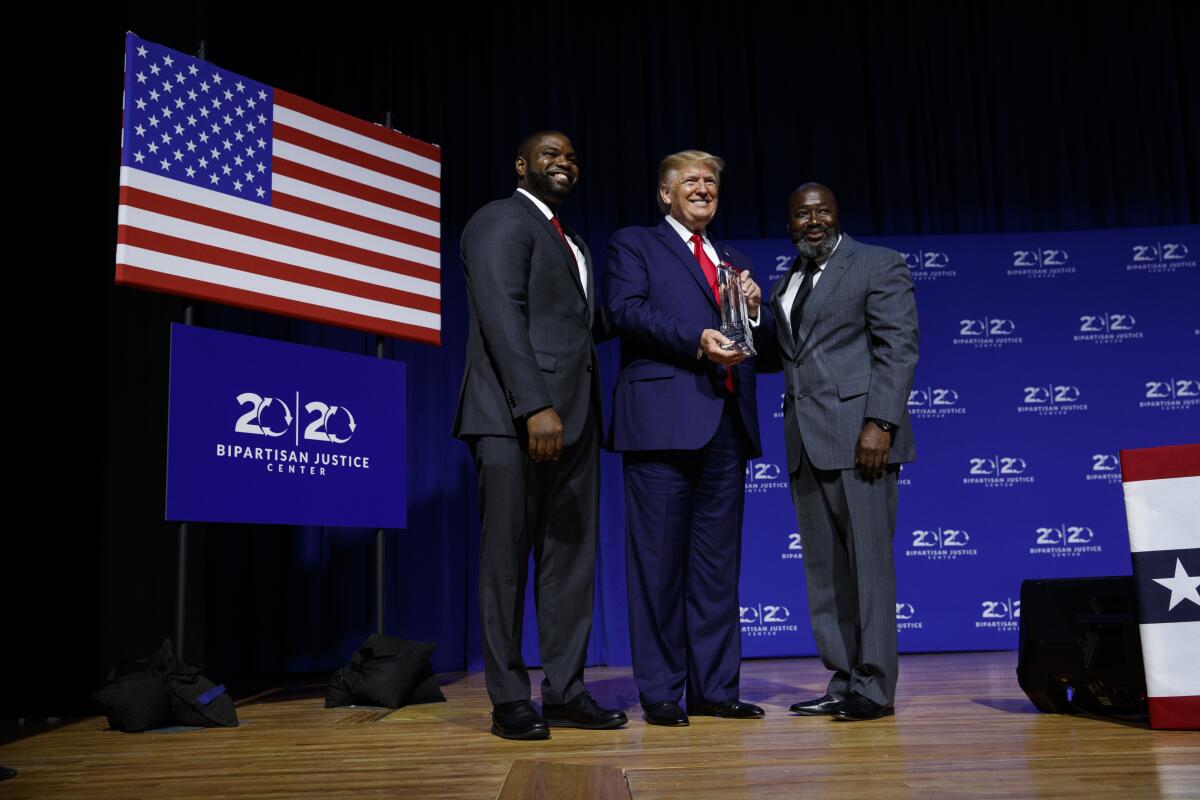Trump touts sentencing reform, praises Cummings in speech at black college in South Carolina

WASHINGTON — President Trump, looking to make inroads with African American voters, touted the bipartisan sentencing reform legislation he signed into law last year during a speech Friday at a historically black South Carolina college.
Speaking to a conference on criminal justice reform at Benedict College in Columbia, S.C., where a number of Democratic hopefuls will also appear this weekend, Trump used an official White House event to make the political case for his reelection and to take credit for the First Step Act, which eased harsh minimum sentences for nonviolent drug offenders.
“Past administrations tried and failed,” Trump said. “They didn’t try very hard, I will say.”
Trump rarely speaks before black audiences and has been criticized for rhetoric that incites white rage. The White House had billed this speech as an opportunity to make his case directly to black voters, who oppose him by large margins.
“We’ve had so many people with empty political rhetoric. We’re doing the opposite. We’re acting, not talking,” he said, citing lower unemployment figures and higher wages.
In the end, however, not many black voters were there to hear his words. Only seven students from the college were seated in the small hall in which Trump spoke, college officials confirmed to the press pool traveling with Trump. About half the seats were reserved for administration allies and guests. News of the seating plan was first reported by McClatchy.
Trump cast the 2018 sentencing bill as a moment of “hope and optimism.” And he reframed his “America First” slogan as a promise to speak up for the voiceless, including African Americans.
“From the beginning, my vow has been to stand up for those who have been forgotten, neglected, overlooked and ignored,” he said.
Trump was less combative than usual and talked about the criminal justice overhaul in moral terms he seldom uses in speeches.
The bill was something bigger than politics and “was not a theme of my campaign initially,” he said.
“To this day, I’m not sure what I did was a popular thing or an unpopular thing, but I know it was the right thing to do,” Trump said.
Trump called three people to the stage, one whose sentence he commuted and two others who have benefited from the new law.
Alice Johnson, whose case was brought to Trump’s attention last year by Kim Kardashian, thanked Trump for her freedom.
“If it wasn’t for you, Mr. President, I’d still be serving five years in prison,” Johnson said, as Trump stood just behind her on stage.
Trump also made a point of praising Rep. Elijah Cummings (D-Md.), who was eulogized Friday by two former presidents at a funeral service in Baltimore earlier in the day that drew scores of prominent politicians, including House Speaker Nancy Pelosi (D-San Francisco) and Senate Majority Leader Mitch McConnell (R-Ky.).
Trump told the audience he hoped to get legislation passed to lower the cost of prescription drugs in honor of Cummings, recalling his passion for the issue.
“I want to give my warmest respects, please,” he said.
Just three months ago, Trump had trashed Cummings, the chairman of the House Oversight Committee that was investigating him, in a tweet storm using racist language, describing the lawmaker’s majority-black district as “a disgusting, rat and rodent infested mess” and a “very dangerous & filthy place” where “no human being would want to live.”
The president’s absence Friday at yet another political funeral underscored his isolation from Washington’s political class and his pariah status, especially during moments of national mourning.
The funeral in Baltimore celebrated Cummings’ life with tributes which, like those delivered at other political funerals over the last two years, sometimes sounded as if they included veiled critiques of Trump.
As a member of Congress, Cummings was referred to as “the honorable,” former President Obama said in his eulogy. “This is a title we confer on all kinds of people who get elected to public office,” he said. “You’re supposed to introduce them as honorable. But Elijah Cummings was honorable before he was elected to office.”
“There’s nothing weak about looking out for others,” Obama continued. “There’s nothing weak about being honorable. You’re not a sucker to have integrity and to treat others with respect.”
The comments came the same week that Trump, on Twitter, compared the Democratic-led impeachment probe to a lynching, drawing sharp criticism from many African Americans. As he departed for Friday’s speech, Trump showed no regret.
“It’s a word many Democrats have used,” Trump told reporters at the White House. “That’s a word that’s been used many times.”
Toward the end of his speech, he compared the threat of impeachment to the disproportionate prosecutions of African Americans, who are incarcerated at five times the rate of white Americans.
“You know I have my own experience,” he told the crowd. “You see it’s a terrible thing going on in our country. It’s an investigation in search of a crime.”
More to Read
Get the L.A. Times Politics newsletter
Deeply reported insights into legislation, politics and policy from Sacramento, Washington and beyond. In your inbox three times per week.
You may occasionally receive promotional content from the Los Angeles Times.












